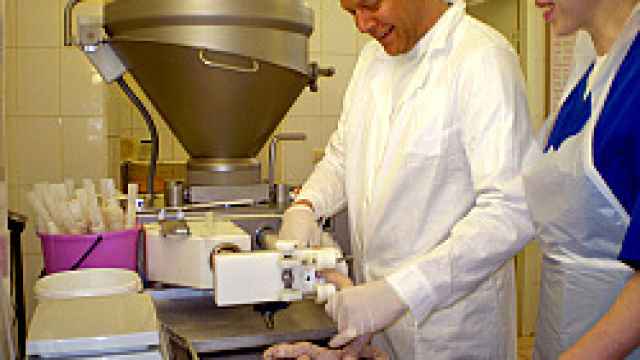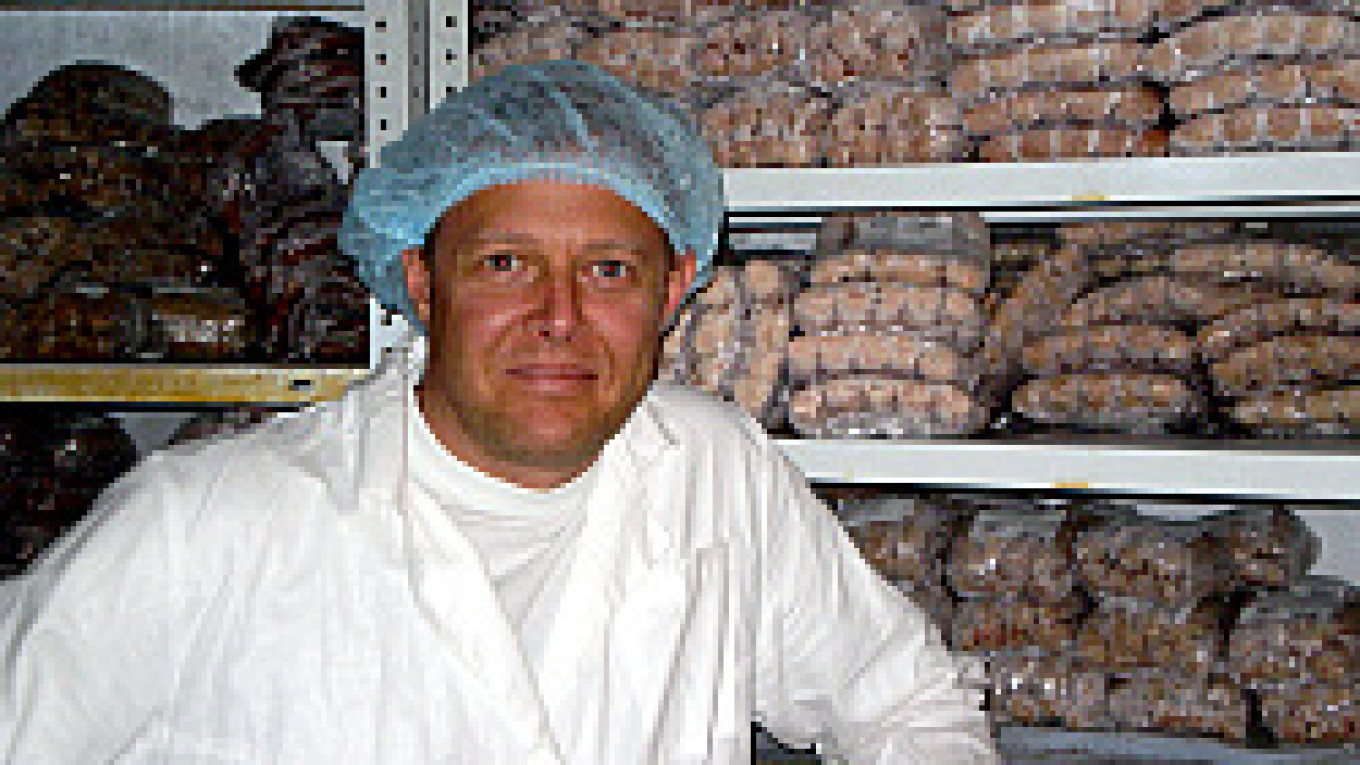"There's probably not an expat in Moscow who doesn't know John," said Robert Procupe, who worked with Warren when he was a grain trader in Rostov-on-Don in the 1990s.
After the Soviet Union disintegrated in 1991, Warren, who had just graduated from Bristol University with a degree in Russian, was desperate to get to Russia. After a brief, two-year spell in Moscow buying and selling commodities, Warren saw a niche in grain trading in the southern city of Rostov. For a while, he made a lot of money, but he was hit hard by the crash and the devaluation of the ruble in 1998. "It was a niche that disappeared," he says. He went bankrupt and was forced to return to Britain, a period he refers to as his sabbatical. He quickly became disillusioned with life "back home" and after nine months was back on his feet again in Moscow working for the investment bank Troika Dialog.
Warren considered two or three business ideas before he came across the sausages, including importing British campers and recycling trash. He started making sausages at home, and because British sausage had never been available in Russia before, the expat community went wild. "I had people phoning me up that I didn't even know saying: John, I'm a friend of a friend. Please can I have some sausages?"
Warren is sure that it was word of mouth that made his business the success it is today. Even now, he spends very little on advertising. Procupe remembers Warren as "charismatic and inspiring and a genius at self-promotion."
If he's invited to a corporate event or a party, he brings his sausages with him. "All I have to do is to take part in the rather fruity life I have over here, and the sausages sell themselves," he says. But Warren clearly takes pride in his business. His clients include the Azbuka Vkusa supermarket and both the British and U.S. embassies. And despite the company's growth, he still offers a personal delivery service.
Warren's Sausages employs 25 people, 23 of them Russian, at a factory in Korolyov, just north of Moscow. Warren says the importance of the mafia in Russian business is exaggerated, and that, in the 16 years he's been doing business here, he's never paid for protection. Dealing with official bureaucracy, however, is another story, and it is something he finds difficult to handle. "I've got people who deal with that, and I've realized that this is possibly one of my failings," he says.

Edward Cowley / for MT
John Warren thought of several business plans before coming up with the idea of making sausages for hungry British expats.
| |
Although he says he is happy with the size of the business, he has some ambitious plans for development. He's bringing out a new brand of pies, which he thinks he might call Puka Pies and estimates that they will need a $100,000 advertising campaign. This time his primary target will be Russians rather than expats. Warren has a contact in the Moscow office of advertising firm Saatchi and Saatchi to help with the roll out, but he has plenty of ideas of his own. "I wanted to get a liveried vintage van and have it break down on Pushkinskaya Ploshad, or have huge spotlights and pan them on big buildings in Moscow during the winter rush hour." Once he's got the pies off the ground, he plans to concentrate on a range of soups.
Warren's life in Moscow isn't only about sausages, however. He's also a musician and a DJ, a side business that has allowed him to network with well-connected Russians. He plays regularly in Moscow clubs and at parties, but it's never been a way of earning a living. "I'm not actively looking to get booked and earn 500 euros playing at a club in Vologda. I'll do it for free," he says.
Before taking up Russian, he won a music scholarship to Winchester College, a prestigious British boarding school, and is a classically trained musician. He sings in a choir and writes music. "This year I'll be 40, and my dream is to take a big step back from the sausages and devote myself to my music," he says.
Warren doesn't have a great answer as to why he started to study Russian. "I learned it because it was sexy. It was a bloody sexy thing to do in those days," he says. Even now that things have stabilized in Russia, what keeps him here is the feeling that there are always new things happening and that the days never turn out quite as expected. "I've always preferred to be a big fish in a small pond," he said, adding, "If I'd been in London for the last 17 years, you wouldn't be taking my interview."
Although he regularly goes back to Britain to visit friends and relatives, he has no plans to move back. He says the England he grew up in no longer exists. "Even if I get thrown out of Russia, I'd go anywhere but England." He admits, though, to missing the big sporting events in Britain, such as the Grand National and the annual Oxford-Cambridge Boat Race.
Warren seems at ease in the fast pace of Moscow life. He rarely sleeps for more than six hours a night and has a seemingly endless reserve of energy. He also drives like the locals, reversing at full speed going the wrong way on one of the busiest roads in Moscow after missing the turn to his factory.
He admits, though, that living in Moscow sometimes gets to him, and he hopes to buy a house one day in a village about 120 kilometers from the city and settle down permanently. When he isn't needed at the factory, he bicycles everywhere he can. He is serious about environmental issues. He also makes regular trips to Rostov-on-Don to see his seven-year-old son, Alex. Alex will soon go to prep school in England and then hopefully, like his father, to Winchester. When asked if the English educational system is still one thing he values about Britain, he says, "I don't know how good it is now, but I want my son to be as English as I am."
Contacts
www.sausage.ru
A Message from The Moscow Times:
Dear readers,
We are facing unprecedented challenges. Russia's Prosecutor General's Office has designated The Moscow Times as an "undesirable" organization, criminalizing our work and putting our staff at risk of prosecution. This follows our earlier unjust labeling as a "foreign agent."
These actions are direct attempts to silence independent journalism in Russia. The authorities claim our work "discredits the decisions of the Russian leadership." We see things differently: we strive to provide accurate, unbiased reporting on Russia.
We, the journalists of The Moscow Times, refuse to be silenced. But to continue our work, we need your help.
Your support, no matter how small, makes a world of difference. If you can, please support us monthly starting from just $2. It's quick to set up, and every contribution makes a significant impact.
By supporting The Moscow Times, you're defending open, independent journalism in the face of repression. Thank you for standing with us.
Remind me later.


